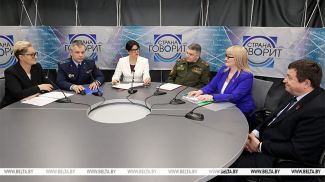MOSCOW, 1 July (BelTA) - Eight programs in science and technology are currently in progress in the Union State, three more are in the pipeline, Russian Deputy Prime Minister Dmitry Chernyshenko said at the plenary session of the 8th Forum of Regions of Belarus and Russia on 1 July, BelTA has learned.
Dmitry Chernyshenko noted that Belarus and Russia have been fruitfully cooperating in science and technology for a long time. One of the priorities of cooperation is the development of the common information and scientific space of the Union State until 2025.
According to him, the Union State has implemented programs in remote sensing of Earth, production of animal feed and genetic research. “Much has already been done. We have designed computing systems using analytical tools for processing geological and geophysical data as part of the SKIF Nedra program, we can now make the components or parts for improving the next generation of special and dual-use systems as part of the program to develop promising semiconductor heterostructure and instruments based on them,” he said. “The Union State is implementing eight projects within the framework of programs in science and technology and is planning three new projects: manufacturing of photonic products, molecular targets, and superconducting accelerating resonators,” he added.
Russia is getting ready to launch the project to expand the national research computer network by including in it leading research centers and universities from the Eurasian Economic Union member states, primarily from Russia and Belarus, Dmitry Chernyshenko added. “So far, the network brings together 150 scientific and educational organizations, 16 supercomputer centers, more than 150 shared access centers, and 110 unique scientific facilities,” he noted. “By the end of 2024, the network will comprise all supercomputer centers, shared access centers, and leading scientific and educational organizations. The total volume of data transferred within the network in the course of a year amounts to more than 60 petabytes. This will facilitate effective cooperation between scientific and educational organizations of the EAEU countries, including thanks to getting remote access to the research infrastructure,” Dmitry Chernyshenko added.











